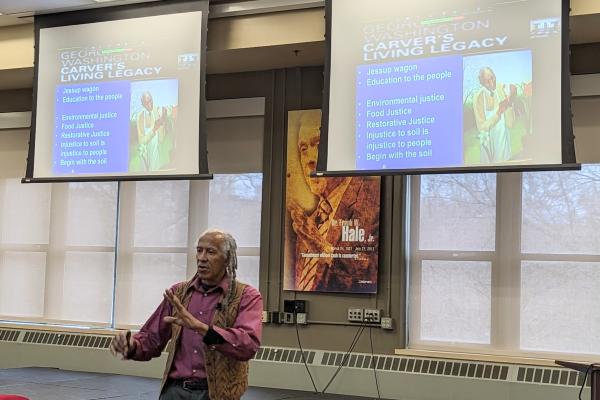
The Department of Comparative Studies is thrilled to welcome back eco-activist, James Beard recipient, and longtime Slow Food member Jim Embry to The Ohio State Campus!
- Click here for in-person attendance (lunch provided; please RSVP by Thursday, February 6th)
- Click here for Zoom attendance
"Hip Hop, Agriculture, and an Ethos of Care for People and Planet"
“HIP HOP is a gateway to our youth…music influences their decisions, what clothes they wear, what they want to be as an adult and even the food choices they make. I connect this culture and art with my work for the community as an O.G. (Organic Gardener) and I write songs that teach environmental awareness and healthy living, all through a HIP HOP lens.” --DJ Cavem
Agriculture – the art and science of cultivating the soil which was the flavor flav gift to humanity by women some 15,000 years ago that now provides most of our food sustenance – is the most basic and essential relationship that humans or Zulu nations have with the Earth. For millennia, our species regarded this Earth/human relationship as a sacred trust that was codified in our religious practices and art expressions.
The past 500 years has witnessed the emergence of European conquest and colonization of the world, inclusive of expropriations of stolen land of Indigenous people and stolen labor of African people to do agriculture. In this history, our tribe-called-quest approach toward agriculture that had once been based upon a sacred trust has since been commodified by a capital market and replaced with an industrial farming system that has brought about catastrophic devastation of the environment and now wreaks break-dancing-like havoc on people and the planet.
A more Earth-centric approach to agriculture, requiring a huge paradigm shift in our thinking, is urgently needed if the human species is to live within planetary boundaries and move beyond our suicidal pathway of corporate dominated development. This keynote address offers that the Great Work (à la Thomas Berry) of this century is to adopt an integrated and nature-based view of the world, as we outline in our “Six Pathways to a Sustainable Future,” noting importantly that these elements are ALL interconnected and not to be seen as separate slices of the MC pie.
While hip-hop culture, a global creative force that transcends music, has influenced fashion, language, and even sports like the Olympics, food has played an integral role in the history of hip-hop, serving as a source of inspiration, cultural expression, and a symbol of identity. In this presentation, we will take a flavorful journey through hip-hop’s history with food and agriculture, exploring how it is referenced in their songs, graffiti art, and other creative expressions.
We believe ever so strongly that the role of young people and art in this transformation work of sampling the best of our current Anthropocene epoch and germinating our much-needed Ecozoic era is integral to the success of our human metamorphosis where another world is possible.
After centuries of an industrial mindset based upon the conquest of nature, we have now the calling for a more creative, constructive, and co-evolutionary relation to the Earth. This species level (r)evolution will necessarily be a DJing-like battle fought disproportionately by the young, given the enormous burden being put on today’s youth, but the struggle must be waged by us all as freestyling phenomena of our human maturation into a species that cares for all the people and our Mother Earth.
"Whatever befalls the Earth, befalls the sons and daughters of the Earth. We did not weave the web of life; we are merely a strand in it. Whatever we do to the web, we do to ourselves.” --Chief Seattle
In collaboration with campus (the Office of Diversity, Equity, and Inclusion in the College of Food, Agricultural, and Environmental Sciences; the Equity, Diversity, and Global Engagement in the College of Education and Human Ecology; the College of Social Work; the Humanities Institute; the Department of Anthropology; the Music Theory and Musicology Area of the School of Music); the Global Arts + Humanities Discovery Theme; and community (Slow Food Columbus; Growing and Growth Collective) partners, Jim and his colleague Jennifer Bailey (an alum of the College of Social Work) will once again be meeting folks via class visits and engagements during their time in Columbus. In fact, this is the first stop in what they've billed as their Joy and Justice Journey in Ohio!
If you are interested in connecting with Jim and/or requesting that he visit your class, or if you would be interested in participating in one of his off-campus engagements, please contact Senior Academic Program Coordinator and Slow Food Columbus Chapter Leader Mark Anthony Arceño (arceno.1@osu.edu). In addition, please contact Mark Anthony for any and all questions about accessibility or to request accommodations. At least two weeks' advance notice will help us to provide seamless access.
Learn more about Jim here!
- Center for Humans and Nature
- "From Civil Rights to Food Justice, Jim Embry Reflects on a Life of Creative Resistance" (Civil Eats)
- "Dismantling Injustice on Juneteenth and Beyond" (Slow Food USA)
- "Community Gardens with Jim Embry" (KET, via YouTube)
Image caption: Jim Embry speaks at last year's keynote address, on the legacy of George Washington Carver. Click here for a recap of his visit.
